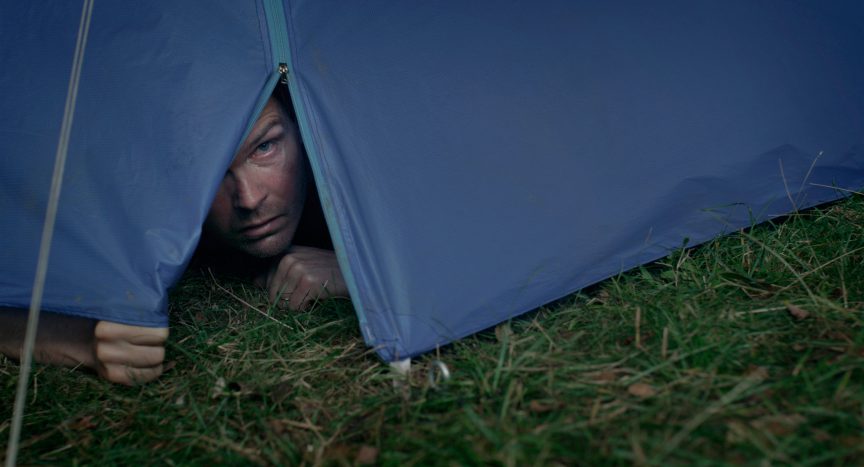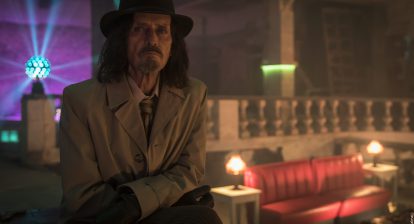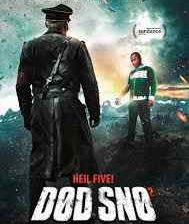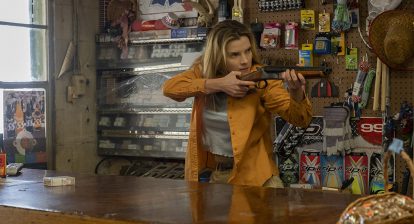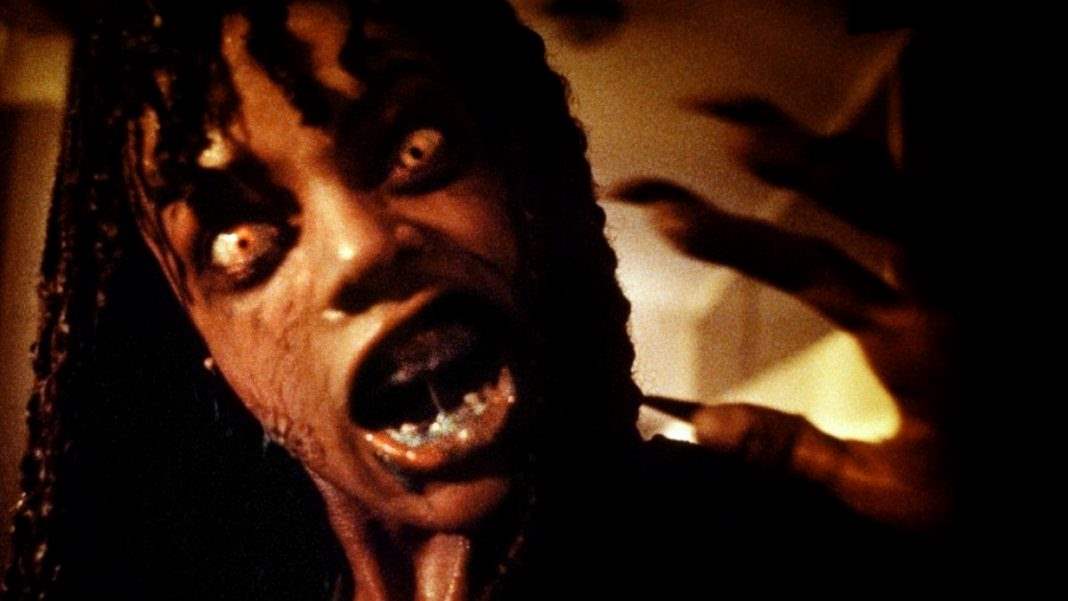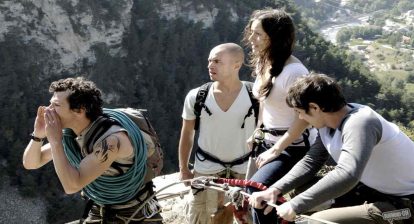Koko-di, Koko-da is the latest proudly bizarro offering from acclaimed Swedish filmmaker Johannes Nyholm (Jätten). And, in the grand tradition of weird Scandinavian fare, it takes some getting used to. There are no easy explanations offered, virtually no exposition to speak of, and the whole thing ends right when most American movies would just be getting started. To describe this as an acquired taste, however, would do it a great disservice. Koko-di, Koko-da isn’t impenetrable, you just have to get on its own particular wavelength to appreciate the film’s anti-beauty.
Related: Jeffrey Reddick’s Don’t Look Back is an Impressively Spooky Debut [Review]
Kicking off with a frightening jaunt through the forest – where, let’s be clear, nothing good ever happens in horror movies for just being there is plenty scary – which ends with a creepy man dressed like a riverboat captain looking directly into the camera and singing what will soon become known as the titular riff, Koko-di, Koko-da establishes immediately that Nyholm isn’t playing around. His previous feature was about a deformed autistic man trying to bond with the birth parents who neglected him by winning a national contest, and this one is no less strange.
We then quickly switch gears to a sweet Aryan family on holiday. Young Maja’s (Katarina Jakobson) eye is turned by a music box in a shop window and, in the grand tradition of strange toys in genre fare, the thing is so ghastly looking it’s difficult to imagine any child wanting it, but it’s her birthday so needs must. At lunch, Maja’s mother, Elin (Ylva Gallon) has a severe allergic reaction, landing the two of them plus Dad Tobias (Leif Edlund) in the hospital overnight. It’s there that the family suffers an unthinkable tragedy, which leaves the young parents reeling.

Skip to three years into the future and Elin and Tobias are still together, but only barely. They’re off on a camping trip even though clearly neither of them actually wants to be there. But, before they can tear each other’s heads off, a creepy trio appears seemingly out of thin air, carrying a bloodied dog carcass for good measure, and subjects the couple to a tortuous mixture of psychological warfare and humiliating slapstick violence. However, soon after, time resets and the same thing happens again. And again, until it’s obvious they’re stuck in a horrifying loop.
Although it sounds head-wrecking, there’s nothing repetitive about what happens to Elin and Tobias. Although the trio’s arrival is signalled in the same manner each time, there are sly differences to the various setups – one even finds Elin emerging to a blanket of fresh snow (a gorgeous effect). The violence is mostly implied, with little bloodshed shown onscreen. When a vicious dog is unleashed on Tobias, who’s locked in the tent with the animal, his cries for help are enough to get the message across. The attacks happen in broad daylight, too, completely out in the open, which makes them even scarier.
In a less ambitious movie, the questions of what’s triggering the arrival and how the couple are going to beat it would be most prominent, but Koko-di, Koko-da has more pressing matters to contend with. Nyholm’s story is one of grief, loss, and personal hardship. His characters are forced to confront deeply-buried emotions under increasingly bizarre circumstances. The trio who terrorizes them, meanwhile, is the stuff of nightmares from the unibrowed, monosyllabic wolfman to the lady with too much hair and the aforementioned riverboat captain. They don’t look particularly intimidating; they’re just unwelcome in an otherwise private environment.
See Also: Detention is a Missed Opportunity [Nightstream Film Festival Review]
There’s an element of sexual deviancy to their attacks, which is uncomfortable but necessary considering when they first show up Elin is busy trying to pee in the forest. She and Tobias are on equal footing when it comes to being accosted, however, which makes Koko-di, Koko-da quite progressive albeit in a very odd way. Nyholm shoots much of the footage handheld, which makes the situation feel more intimate whether the camera is crouching in the back of a car, listening to Tobias and Elin argue, or hiding there from the action almost as though we’re afraid to watch.

The film could easily be taken as a kind of dark fairy-tale, from the titular refrain (which is surprisingly catchy) to the sweet, charming animated interludes that blend childish scribbles and pretty watercolours beautifully. There’s darkness to those too, though, the featured stories dealing predominantly with death and loss. Animals feature prominently throughout also, from dogs to cats and, in particular, one white kitty that pops up at random but clearly holds deeper meaning for Tobias and Elin. There’s a terrific shot of it in a rear-view mirror that’s haunting. Whether or not the animal is symbolic is up to personal interpretation, but there’s certainly suggestion that something, or someone, is watching over the central couple.
Both Edlund and Gallon commit themselves fully to the off-kilter atmosphere of Koko-di, Koko-da, convincingly portraying three very different stages in their relationship. While their attackers are less developed, each member has their own distinctive creepy style. In spite of how much work the couple clearly still has to do both for themselves and each other, it’s kind of hard not to root for them. After all, classic fairy-tales end with the prince and princess happily together. As fairy-tales go, however, this is a particularly dark one. But, to Nyholm’s great credit, as strange and unusual as his story is, it’s never anything less than fully involving. For better or worse, you’ll want to go down to the woods with him.
Catch Koko-di, Koko-da in virtual theaters in major cities (check listings)
from November 6 and on VOD from December 8
WICKED RATING: 8/10
Director(s): Johannes Nyholm
Writer(s): Johannes Nyholm
Stars: Leif Edlund, Ylva Gallon, Peter Belli, Katarina Jakobson
Release date: November 6, 2020 (virtual theaters), December 8, 2020 (VOD)
Studio/Production Company: Beofilm
Language: Danish, Swedish
Run Time: 89 minutes
